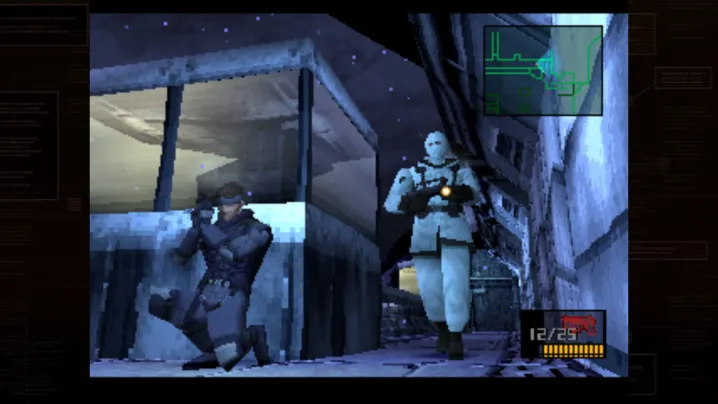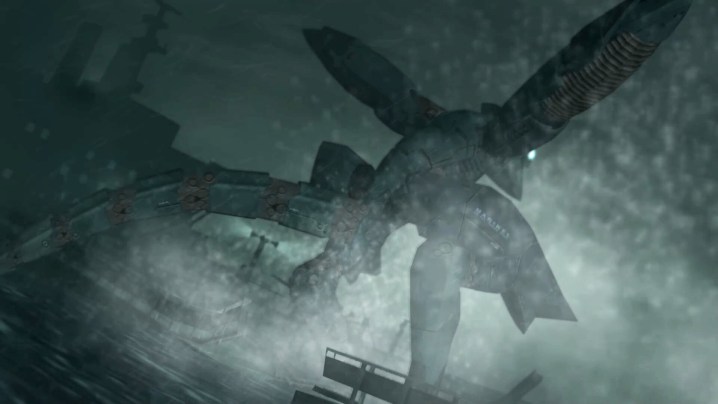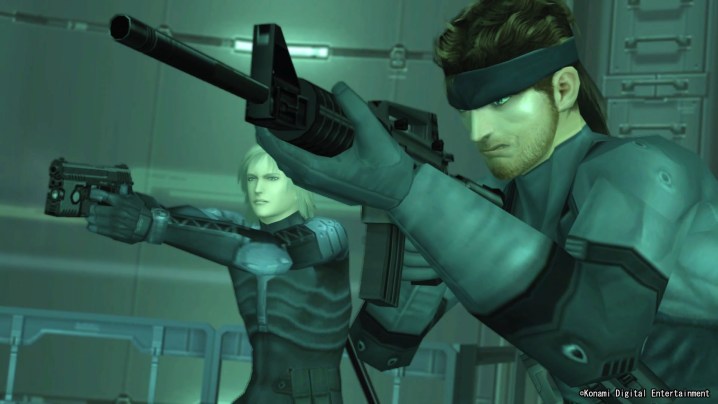It’s never been a better time to replay the Metal Gear Solid series — and that fills me with dread.
Usually, I’m overjoyed anytime I have an excuse to recommend an old game I love. While I’ve spent my life gaming alone in various living rooms, I believe those experiences are meant to be shared. There’s joy in getting to introduce something special to someone who’s never played before and then getting to see their reactions. But when it comes to Metal Gear Solid, that recommendation usually comes with a somber undertone.
That’s where I find myself with the release of Metal Gear Solid: Master Collection Vol. 1. The new compilation is undeniably a must-own, bringing together some of the finest games of all time into one bonus-rich package. Whether you’re a series veteran hungry for a replay or a newcomer trying to get up to speed before the Metal Gear Solid 3 remake, it’s a perfect time to revisit the stealth classics.
And it’s always the perfect time to revisit them. It’ll never stop being the perfect time. That’s because Metal Gear Solid’s prescient commentary on war and the powerful people that perpetuate and encourage its atrocities has never stopped being relevant. As long as we’re stuck in a cycle of government-backed violence and misinformation, Metal Gear Solid will always earn another replay.
Weapons of mass destruction
The landmark Metal Gear series would begin its life on the NES in 1987, introducing the world to Hideo Kojima’s ambitious spy thriller series. That game would pack plenty of narrative into a limited cartridge, telling the story of super soldier Solid Snake as he foils a mercenary group’s plans to control a mechanized weapon of mass destruction, the mechanized Metal Gear. While it would quickly spawn two sequels (one of which was quickly made without Kojima’s input), the series would really take off between 1998 and 2004 with a quick trilogy of games under a new Metal Gear Solid branding.
Metal Gear Solid: Master Collection Vol. 1 is a celebration of that lineage, packing the series’ first five mainline entries into one package. That includes multiple titles that wouldn’t be out of place on an “all-time best, list like Metal Gear Solid 2: Sons of Liberty and Metal Gear Solid 3: Snake Eater. I don’t need to say much more to sell just about anyone on the package. The HD remasters included don’t mess with the originals and each game comes with some excellent bonuses that make this feel like a definitive collector’s edition. The inclusion of scripts is especially a highlight, giving a little peak at how Kojima’s dense stories are structured. I’m sure those who have played these games over and over will have their nitpicks (it’s deeply annoying that each game is downloaded as its own separate app), but most players should be happy with what they’re getting here.
But it doesn’t really matter how these games are packaged. Whether they were haphazardly dropped on Steam or given a glitzy remaster, it’s all the same: The Metal Gear Solid series continues to stand tall as one of gaming’s most vital and upsettingly enduring stories. Going any further necessarily requires some spoilers, so if you haven’t treated yourself to the series yet, be forewarned.

To this day, Kojima’s Metal Gear Solid installments remain some of the few big-budget games that dare to say anything substantial about our world’s military-industrial complex. Never mind the cybernetic ninjas, memory card-reading psychics, and convoluted cloning schemes — underneath all its techno silliness, the Kojima-directed entries offer a sprawling critique of the world’s obsession with warfare and the way superpowers continue to push the moral limits of powerful weaponry. At its heart, this is a series about the irresponsibility of nuclear weapons and high-tech death machines. In the first Metal Gear Solid, Solid Snake is sent on a mission to retrieve the deadly Metal Gear Rex from a terrorist organization threatening the U.S. It’s a typical rah-rah American rescue mission … until it isn’t.
Metal Gear Solid takes a sharply critical turn deep in its story, as it’s revealed that Snake is just a tool of the U.S. government — an unwitting weapon himself. The Pentagon isn’t concerned with thwarting terrorists so much as it’s trying to get its hands on Rex, to give it control of the most powerful war machine imaginable. There’s nothing just or righteous about the operation; it’s just a violent power play.
And we’ve been living in a real world series of those ever since then.
Controlling information
The first time I ever really experienced the Metal Gear Solid franchise was sometime around 2002. I was an angsty kid still grappling with the horrifying aftermath of September 11, and I’d head over to my cousin’s house to play. At the time, he was deep into Metal Gear Solid 2: Sons of Liberty, which had just been released for PlayStation 2 in November 2001 — only two short months after those terrorist attacks.
It seemed like the perfect game for the moment. For its first few hours, it presents itself as an all-American spy thriller, as Solid Snake thwarts a terrorist threat on an oil tanker off the coast of New York City. He must stop the bad guys from obtaining weapons of mass destruction. Even now, it’s a little eerie thinking about how that story, which had been in development for years, would drop so close to September 11. It almost felt prophetic at the time.

And it was, though not in ways I’d realized at the time. Metal Gear Solid 2’s nationalistic pride is a smokescreen that begins to dissipate halfway through the game. For the bulk of its runtime, players control the blonde-haired Raiden (a twist that infuriated fans at the time) on a quest to save the president from terrorists two years after Snake’s mission. It’s all standard 2000s spy movie fare, but that gets subverted in the same way the first Metal Gear Solid does. A midgame twist reveals a grander conspiracy: A shadow group called the Patriots secretly runs America and is looking to gain control of a massive weapon called Arsenal Gear. The terrorist threat is a convenient cover for them to pull off their shady plan under the American people’s noses.
The Patriots have two objectives. The more obvious one is that they wish to control the most unstoppable weapon suite known to man, in a bid to holding on to America’s position as a military superpower. Their second goal is much more nefarious. As the game is set during the rise of the internet age, the Patriots sense that information is about to become easier to distribute to the people. They face an era where they’ll no longer be able to commit their most heinous war crimes in the shadows. Arsenal Gear contains the power to control the flow of information, making it the world’s most valuable commodity.
War — and its consumption of life — has become a well-oiled machine.
As the 2000s marched on, it would retroactively become a searing critique of America’s War on Terror. Retribution for the horrific attacks of September 11 would mutate into a violent hunt for oil. Media would parrot the Bush administration’s fishy lines about hidden weapons of mass destruction. Middle Eastern civilians would get caught in the crossfire as America turned war into resource-rich profit. It would almost happen under the American public’s radar, but the rising democratization of information would earn the Bush administration heat from vocal detractors. No amount of wool could hide what was happening from watchful eyes.
War becomes routine
Despite knowing that story intimately, I wouldn’t experience it firsthand until playing through it as part of the Master Collection. As it turns out, it’s still as bleakly relevant now as it was upon its release. I’d find myself playing it amid another heated world conflict, as Israel continued its all-out attack on Gaza in retribution for a deadly terrorist plot carried out by Hamas. The group’s grotesque massacre was met with a barrage of bombs that would kill thousands of Palestinian civilians. Regardless of which side of the conflict one may fall on, the images of innocents caught in the crossfire are difficult to stomach. Even worse is that it’s been difficult to separate fact from fiction amid conflicting reports on the collateral damage from media and government officials alike.
Terrorism, revenge, massacred civilians, misinformation fueling the fire. It brings me right back to the chaos of the 2000s, as I’m forced to watch my own government uncritically support a military operation that’s already claimed countless innocent lives. With a lack of firm information to clarify the situation, I can’t help but feel pressured into falling in line with the global war machine’s insatiable hunger for blood. Metal Gear Solid 2: Sons of Liberty once again puts words to those anxieties, as it has so many times in my life. I’m Raiden struggling to keep up with a convoluted conspiracy that feels like it was designed to mislead me.

As I grappled with those painful feelings during my playthrough, my mind went to a game not included in the Master Collection (at least not in this first volume). Metal Gear Solid 4: Guns of the Patriots opens with a striking monologue that sets up its dystopian future where the narrative of never-ending conflicts is held in an ironclad grip by those invested in them.
“War has changed. It’s no longer about nations, ideologies, or ethnicity. It’s an endless series of proxy battles fought by mercenaries and machines. War — and its consumption of life — has become a well-oiled machine … The age of deterrence has become the age of control, all in the name of averting catastrophe from weapons of mass destruction. And he who controls the battlefield controls history. War has changed. When the battlefield is under total control, war becomes routine.”
Metal Gear Solid is once again the video game series of the moment. God, I wish it weren’t.
Metal Gear Solid: Master Collect Vol 1 launches on October 24 for PlayStation 5, PS5, Xbox Series X/S, Nintendo Switch, and PC.
Editors’ Recommendations
Services Marketplace – Listings, Bookings & Reviews